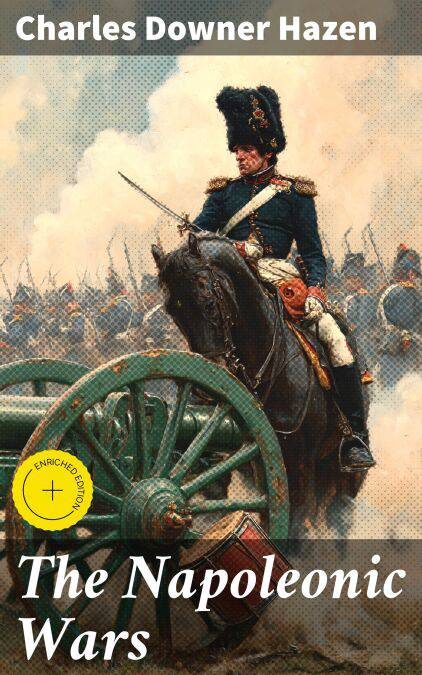
Bedankt voor het vertrouwen het afgelopen jaar! Om jou te bedanken bieden we GRATIS verzending (in België) aan op alles gedurende de hele maand januari.
- Afhalen na 1 uur in een winkel met voorraad
- In januari gratis thuislevering in België
- Ruim aanbod met 7 miljoen producten
Bedankt voor het vertrouwen het afgelopen jaar! Om jou te bedanken bieden we GRATIS verzending (in België) aan op alles gedurende de hele maand januari.
- Afhalen na 1 uur in een winkel met voorraad
- In januari gratis thuislevering in België
- Ruim aanbod met 7 miljoen producten
Zoeken
The Napoleonic Wars E-BOOK
Enriched edition. Europe in Turmoil: A Detailed Account of Napoleon's Campaigns and the Battle for Power
Charles Downer Hazen
E-book | Engels
€ 1,99
+ 1 punten
Uitvoering
Omschrijving
In "The Napoleonic Wars," Charles Downer Hazen crafts a comprehensive and incisive examination of one of history's most tumultuous eras. Through a meticulously researched narrative, Hazen presents the political, military, and social dimensions of the Napoleonic Wars, employing an analytical style that interweaves primary sources with contemporary accounts. The book situates the conflicts within the broader context of European power dynamics, exploring the implications of Napoleon Bonaparte's rise and fall not only in France but across the continent. His effective use of vivid detail and engaging prose brings the battles and treaties to life, making the complex historical events accessible to both scholars and lay readers alike. Charles Downer Hazen was a prominent American historian whose academic pursuits often reflected a deep interest in political science and the impact of historical events on modern governance. Educated at prestigious institutions, including Columbia University, Hazen's scholarly work was influenced by the prevailing currents of historical inquiry during the early twentieth century, when there was a growing fascination with understanding the connections between history and contemporary issues. His scholarly background and commitment to rigorous research are evident throughout this work. This book is highly recommended for anyone seeking a nuanced understanding of the Napoleonic Wars and their far-reaching consequences. Hazen's meticulous scholarship and engaging writing style make this an essential text for students, historians, and history enthusiasts alike. It provides essential insights into the complexities of war and politics, illuminating the legacy of Napoleon that continues to shape Europe and the world today.
In this enriched edition, we have carefully created added value for your reading experience:
- A succinct Introduction situates the work's timeless appeal and themes.
- The Synopsis outlines the central plot, highlighting key developments without spoiling critical twists.
- A detailed Historical Context immerses you in the era's events and influences that shaped the writing.
- A thorough Analysis dissects symbols, motifs, and character arcs to unearth underlying meanings.
- Reflection questions prompt you to engage personally with the work's messages, connecting them to modern life.
- Hand‐picked Memorable Quotes shine a spotlight on moments of literary brilliance.
- Interactive footnotes clarify unusual references, historical allusions, and archaic phrases for an effortless, more informed read.
In this enriched edition, we have carefully created added value for your reading experience:
- A succinct Introduction situates the work's timeless appeal and themes.
- The Synopsis outlines the central plot, highlighting key developments without spoiling critical twists.
- A detailed Historical Context immerses you in the era's events and influences that shaped the writing.
- A thorough Analysis dissects symbols, motifs, and character arcs to unearth underlying meanings.
- Reflection questions prompt you to engage personally with the work's messages, connecting them to modern life.
- Hand‐picked Memorable Quotes shine a spotlight on moments of literary brilliance.
- Interactive footnotes clarify unusual references, historical allusions, and archaic phrases for an effortless, more informed read.
Specificaties
Betrokkenen
- Auteur(s):
- Uitgeverij:
Inhoud
- Aantal bladzijden:
- 75
- Taal:
- Engels
Eigenschappen
- Productcode (EAN):
- 8596547786351
- Verschijningsdatum:
- 21/12/2023
- Uitvoering:
- E-book
- Beveiligd met:
- Digital watermarking
- Formaat:
- ePub

Alleen bij Standaard Boekhandel
+ 1 punten op je klantenkaart van Standaard Boekhandel
Beoordelingen
We publiceren alleen reviews die voldoen aan de voorwaarden voor reviews. Bekijk onze voorwaarden voor reviews.









